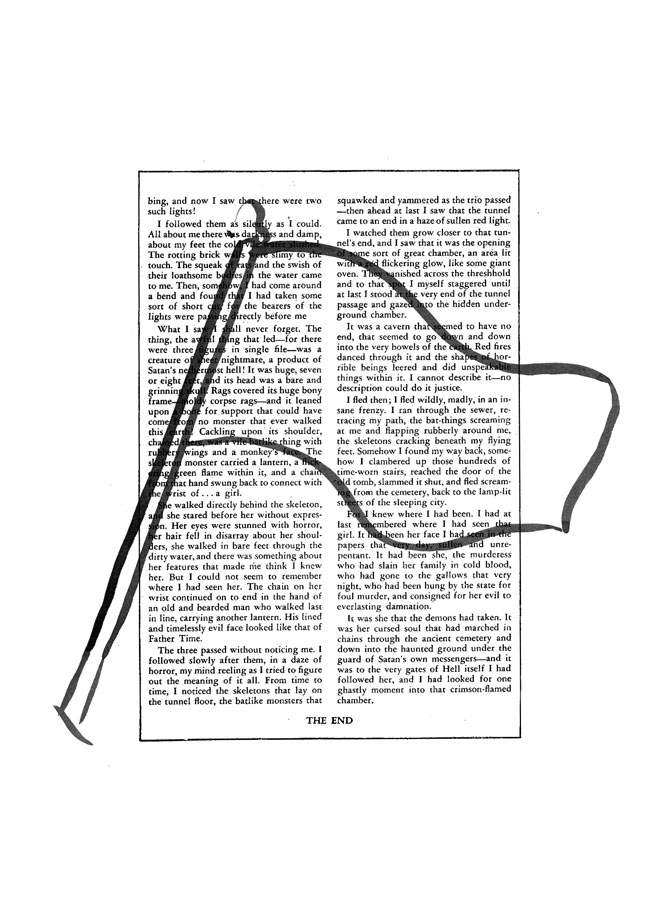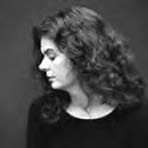 The Undertaker’s Tale of the Notebook Measuring 1 × 2 cm The Undertaker’s Tale of the Notebook Measuring 1 × 2 cm
For forty years now I have had in my possession:
A notebook, morocco-bound and blue in colour
which was so small it could be covered over by a thumb.
I found it at the bottom of her
apron pocket;
And for forty years I have had in my throat
the rotten apple of Mordovia
which for forty years
I could not swallow;
And I have held in my possession
the year Nineteen-Forty-
One:
a year too small for her
to write in.
Cuento del director de funeraria sobre la libreta que medía 1 × 2 cm
Durante cuarenta años tuve en mi poder:
Una libreta, con encuadernado marroquí y de color azul
que era tan pequeña que se podía tapar con un pulgar.
La encontré al fondo del
bolsillo de su delantal;
Y durante cuarenta años tuve en mi garganta
la manzana podrida de Mordovia
que por cuarenta años
no me pude tragar;
Y he mantenido en mi poder
al año Mil-Novecientos-Cuarenta
y Uno:
un año tan pequeño que ella
no podía escribir en él.
Red Flag
Once one of them showed me how to:
You turn this (the right) hand to grasp the stock.
You turn this (the left) hand to grasp the barrel.
He touched my knee,
and I hid my surprise –
but now he’s changed his tune.
36, 37, 38.9
I’ve a fever little sparrow, I am sick.
Their flag is flying red,
I can hear it from my window,
I hear it tattered like a torn red rag.
Go and get it little bird,
go and tell them danger! danger!
I will wear it as my Sunday Dress.
I’ll wear it walking on the moor
where they practice with their guns.
38.9, 37, 36
How ashamed they’ll be
to hurt a young and pretty
girl like me.
Bandera roja
Una vez uno de ellos me mostró cómo:
Giras esta mano (la derecha) para agarrar la culata.
Giras esta mano (la izquierda) para agarrar el cañón.
Tocó mi rodilla,
y oculté mi sorpresa;
pero ahora ha cambiado su canción.
36, 37, 38.9
Tengo fiebre, golondrina, estoy enferma.
Su bandera ondula roja,
la puedo oír desde mi ventana,
la escucho raída como un trapo rojo rasgado.
Ve por él, pajarito,
ve y diles ¡peligro! ¡peligro!
Lo llevaré como Vestido Dominical.
Lo llevaré cruzando el páramo
donde practican con sus pistolas.
38.9, 37, 36
Qué avergonzados estarán
de lastimar a una muchacha
joven y bonita como yo.
Questions
1. Did you ever play the piano again after your mother died and if so, what did you play?
2. Could you sing and did you ever sing later on in life when you were married and living away
from Moscow?
3. If you can remember (and please try) what songs exactly did you sing?
4. What did you think when you took your pen in your hand and wrote that letter to Stalin?
5. Did you feel a kind of heat of the mind and also a chill somewhere in your stomach?
6. Did your hand shake?
7. Is time mostly to do with feeling and thought?
8. Is time a trap, in your opinion?
9. Am I completely responsible for what I do with time, or not at all, or partly?
10. How powerful – would you say – is a poem not to do with war?
11. Did you like the violin?
12. Were you an insomniac?
13. Compared, I mean, to one about war?
Preguntas
1. ¿Alguna vez volvió a tocar el piano después de que murió su madre y de ser así, qué tocó?
2. ¿Podría cantar y alguna vez cantó años después cuando estaba casado y viviendo fuera de
Moscú?
3. Si lo recuerda (y por favor inténtelo) ¿qué canciones cantó exactamente?
4. ¿Qué pensaba cuando tomó la pluma y le escribió esa carta a Stalin?
5. ¿Sintió una especie de calentura y también un escalofrío en algún lugar del estómago?
6. ¿Le temblaron las manos?
7. ¿El tiempo tiene que ver principalmente con el sentimiento y la razón?
8. ¿El tiempo es una trampa, en su opinión?
9. ¿Soy completamente responsable de lo que hago con el tiempo, o no en lo absoluto, o en parte?
10. ¿Qué tan poderoso —diría usted— es un poema que no tiene que ver con la guerra?
11. ¿Le gustaba el violín?
12. ¿Era insomne?
13. ¿En comparación, digo, con uno que trate sobre la guerra?
|
|
Poemas publicados originalmente en This is Yarrow (Carcanet, 2012). Reproducidos con el permiso de la editorial.
 Tara Bergin. Se mudó a Inglaterra en 2002. En 2012 completó su investigación de doctorado en la Universidad de Newcastle, centrándose en las traducciones de Ted Hughes de János Pilinszky. Su poesía ha sido publicada en Poetry London, Poetry Review, Modern Poetry in Translation y Poetry Nation Review, así como en la antología New Poetries V (Carcanet, 2011). Fue galardonada con el premio de poesía Seamus Heaney en 2014. This is Yarrow (Carcanet, 2012) es su primer libro. Tara Bergin. Se mudó a Inglaterra en 2002. En 2012 completó su investigación de doctorado en la Universidad de Newcastle, centrándose en las traducciones de Ted Hughes de János Pilinszky. Su poesía ha sido publicada en Poetry London, Poetry Review, Modern Poetry in Translation y Poetry Nation Review, así como en la antología New Poetries V (Carcanet, 2011). Fue galardonada con el premio de poesía Seamus Heaney en 2014. This is Yarrow (Carcanet, 2012) es su primer libro.
|
